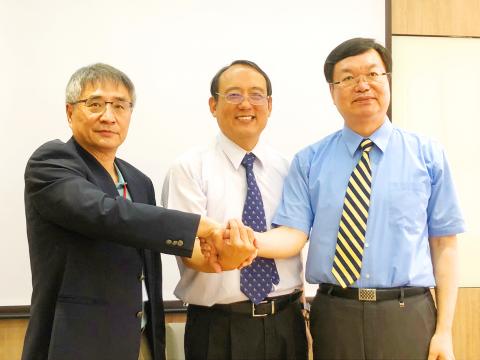Officials at National Taiwan University of Science and Technology (NTUST), National Pingtung University of Science and Technology (NPUST) and National Yunlin University of Science and Technology yesterday said that they would promote a merger of the three.
If successful, it would be the largest higher-education merger in Taiwan’s history.
The new institute would have more than 1,200 lecturers and 32,000 students, the universities said.

Photo: Lo Hsin-chen, Taipei Times
While they have yet set a timetable for the merger, they said that they hope to have plans approved at university council meetings by the end of this year.
The plan has been reported to the Ministry of Education, they said.
The goal is to have the new institute recognized as a top Asian university in three to five years after the merger, they said.
NTUST president Liao Ching-jong (廖慶榮) said that he and NPUST president Tai Chang-hsien (戴昌賢) began discussing a merger between three about a month ago.
They agreed that having a third technological university from central Taiwan would make the new university more globally competitive, Liao said.
As the goal is to increase scale, none of the three universities would be downsized, Tai said.
Given that the process would involve many legal issues, they have asked lawmakers to help promote amendments to regulations covering public universities, Tai said.
If the merger succeeds, it would become a new model for mergers, he said.
National Yunlin University of Science and Technology president Yang Neng-shu (楊能舒) said that he would be happy to see the plan succeed, adding that he would establish a panel to handle tasks related to the plan.
While the three have not decided on a name for the new institute, they said they have agreed that “National Taiwan University of Science and Technology” would likely be kept.
The three might be renamed NTUST’s Taipei campus, Yunlin campus and Pingtung campus, they said, adding that the final name must be agreed to by all three universities.
Yang Yu-hui (楊玉惠), director of the ministry’s Technological and Vocational Education Department, said that she would be happy to see the merger succeed, as long as it would help make the universities more competitive and that there would be no exchange of benefits.
Expenses, faculty and student numbers are expected to remain the same for the three following the merger, Yang Yu-hui said.
Additional reporting by Wu Po-hsuan

Chinese spouse and influencer Guan Guan’s (關關) residency permit has been revoked for repeatedly posting pro-China videos that threaten national security, the National Immigration Agency confirmed today. Guan Guan has said many controversial statements in her videos posted to Douyin (抖音), including “the red flag will soon be painted all over Taiwan” and “Taiwan is an inseparable part of China,” and expressing hope for expedited reunification. The agency last year received multiple reports alleging that Guan Guan had advocated for armed reunification. After verifying the reports, the agency last month issued a notice requiring her to appear and explain her actions. Guan

GIVE AND TAKE: Blood demand continues to rise each year, while fewer young donors are available due to the nation’s falling birthrate, a doctor said Blood donors can redeem points earned from donations to obtain limited edition Formosan black bear travel mugs, the Kaohsiung Blood Center said yesterday, as it announced a goal of stocking 20,000 units of blood prior to the Lunar New Year. The last month of the lunar year is National Blood Donation Month, when local centers seek to stockpile blood for use during the Lunar New Year holiday. The blood demand in southern Taiwan — including Tainan and Kaohsiung, as well as Chiayi, Pingtung, Penghu and Taitung counties — is about 2,000 units per day, the center said. The donation campaign aims to boost

The Kaohsiung Tourism Bureau audited six hotels in an effort to prevent price gouging ahead of Korean band BTS’ concert tour in the city scheduled for Nov. 19, 21 and 22 this year. The bureau on Friday said that the audits — conducted in response to allegations of unfair pricing posted on social media — found no wrongdoing. These establishments included the local branches of Chateau de Chine, Hotel Nikko, My Humble House, and Grand Hai Lai, it said, adding that the Consumer Protection Commission would have penalized price gougers had the accusations been substantiated. The bureau said the Tourism Development Act

BACK TO WINTER: A strong continental cold air mass would move south on Tuesday next week, bringing colder temperatures to northern and central Taiwan A tropical depression east of the Philippines could soon be upgraded to be the first tropical storm of this year, the Central Weather Administration (CWA) said yesterday, adding that the next cold air mass is forecast to arrive on Monday next week. CWA forecaster Cheng Jie-ren (鄭傑仁) said the first tropical depression of this year is over waters east of the Philippines, about 1,867km southeast of Oluanpi (鵝鑾鼻), and could strengthen into Tropical Storm Nokaen by early today. The system is moving slowly from northwest to north, and is expected to remain east of the Philippines with little chance of affecting Taiwan,